May 21, 2025 | 09:35 GMT +7
May 21, 2025 | 09:35 GMT +7
Hotline: 0913.378.918
May 21, 2025 | 09:35 GMT +7
Hotline: 0913.378.918
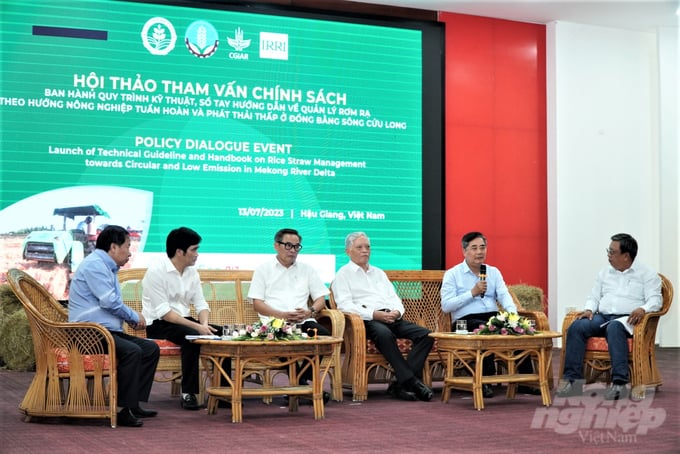
Delegates attended the workshop “Policy Consultation Session on Rice Straw Management towards circular and low-emissions agriculture”. Photo: Hoang Vu.
On July 13, in Vi Thanh city (Hau Giang), the Department of Crop Production (MARD) in collaboration with the International Rice Research Institute (IRRI) held a workshop “Policy Consultation Session on Rice Straw Management towards circular and low-emissions agriculture” and a ceremony to announce the issuance of the rice straw management procedure and manual.
Many delegates and experts attended the event, including former Minister of Agriculture and Rural Development Cao Duc Phat, former Deputy Minister of Agriculture and Rural Development Bui Ba Bong, Chief Representative of IRRI in Vietnam, leaders of the Department of Crop Production, Departments of Agriculture and Rural Development of provinces and cities in the Mekong Delta, as well as representatives of universities, research institutes, scientists, businesses, cooperatives and international experts.
At the workshop, Nguyen Nhu Cuong, Director of Department of Crop Production, said that rice production in the Mekong Delta has had a very impressive development in recent years, with rice yield reaching over 24 million tons of rice/year. However, most farmers only focus on harvesting rice, while its straw and husks have not been utilized.
Given the production area and yield of rice, the annual amount of rice straw discharged after harvest in the Mekong Delta is estimated at over 24 million tons. However, statistics show that only 30% of them are collected and treated, while the rest is burned. This is a big waste in rice production, polluting the environment and increasing greenhouse gas emissions.
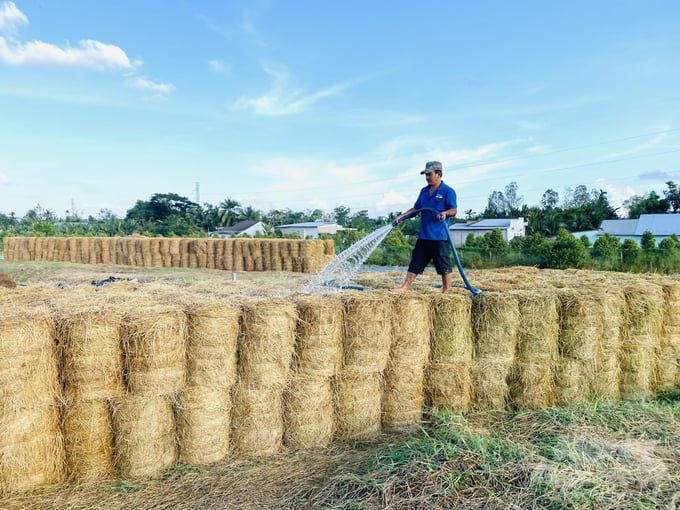
Collecting and treating rice straws not only brings added value but also mitigates environmental pollution. Photo: Hoang Vu.
At the workshop, the delegates discussed orientations and policies for straw management for the Scheme "Sustainable production of 1 million ha of high-quality, low-emission specialized rice associated with green growth in the Mekong Delta", the linkage between actors including the state - enterprises - farmer organizations - science and technology in implementing rice straw management towards circular and low-emissions agriculture.
Former Minister of Agriculture and Rural Development Cao Duc Phat, Chairman of the Board of Directors of IRRI said, “Burning straw both causes a loss of nutrients contained in straw and a loss of biodiversity, not to mention environmental pollution. Meanwhile, burying straw in flooded fields causes increased methane emissions and greenhouse gas emissions. Reality calls for specific policies and technical guidelines to manage and use rice straw in the Mekong Delta in particular and Vietnam in general, in the direction of circular and low-emissions agriculture”.
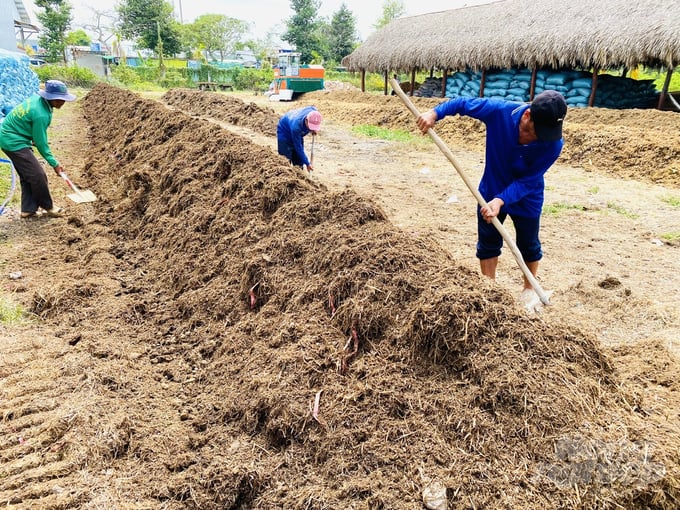
Tens of millions of tons of rice straw are being wasted in the Mekong Delta, if collected and processed into organic fertilizer, it will bring great value and reduce environmental pollution. Photo: Hoang Vu.
The IRRI delegate also mentioned two major challenges that rice production in the Mekong Delta is facing: One, the act of managing straw after harvest has not caught the attention of the mass, and two, the rice value chain is still unsustainable.
“On the bright side, the Ministry of Agriculture and Rural Development has a scheme for agricultural restructuring that has been implemented for more than 10 years, achieving many encouraging results. The scheme has made great changes to the rice industry, especially the shift of mindset to agricultural economy.
“But there are still many stages in the rice value chain that have not been effectively promoted. We have focused a lot on the production stage but are still limited in the post-harvest stage. With the companionship of businesses, we need to guide and encourage farmers to make full use of wasted materials like straw and husks”.
According to Dr. Bui Ba Bong, former Deputy Minister of Agriculture and Rural Development, straw management must achieve two purposes: circulation and reduction of greenhouse gas emissions. “In straw management, we have only paid attention to increasing profits or returning it to the field for nutrition, but we pay little attention to reducing greenhouse gas emissions caused by straw. The optimal solution is to move rice straw out of the field, process it in a circular and closed process”.
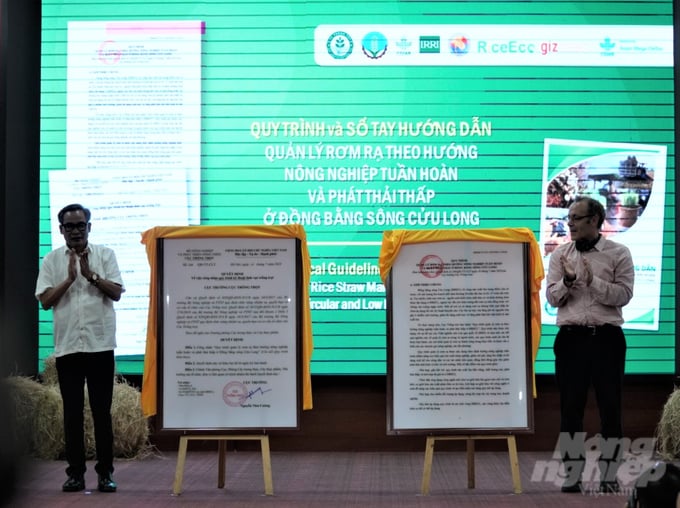
The Department of Crop Production and the International Rice Research Institute published the “Rice Straw Management Manual and Procedure towards circular and low-emissions agriculture in the Mekong Delta”. Photo: Hoang Vu.
Dr. Tran Ngoc Thach, Director of the Mekong Delta Rice Research Institute, said that since 2000 the institute had built a procedure to process rice straw into fertilizer and bring the fertilizer back to the field. “Through continuous research, we realize if we apply 6 tons of organic fertilizer for 1 ha of rice, it can replace 50% of chemical fertilizers used in rice cultivation. But the market price of organic fertilizer is currently VND 3 million/ton, so it is not economically efficient”.
Director Thach suggested that organic fertilizer made from rice straw should be used for other crops such as vegetables to bring higher value. As for the straw, after being moved out of the field, farmers are recommended to utilize mushroom cultivation, and then use this straw to make organic fertilizer because it will shorten the composting time. The stubble remaining in the field should also be applied microbial products to treat decay quickly, thereby creating a source of nutrients to return to the field, limit emissions or organic poisoning for early-crop rice.
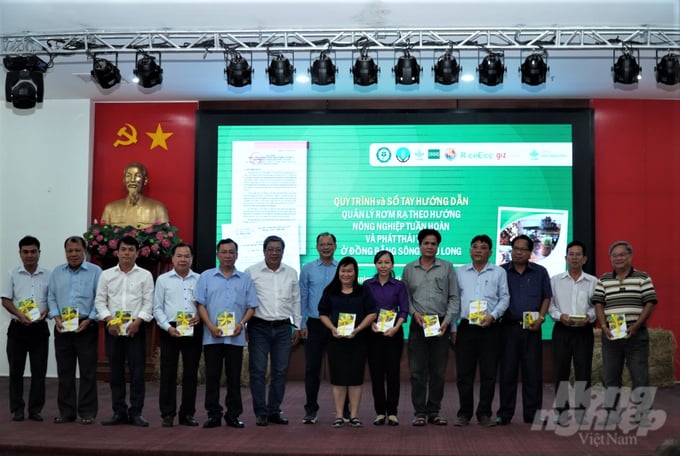
The Department of Crop Production presented the Manual of Rice Straw Management to representatives of the local agricultural sector. Photo: Hoang Vu.
At the workshop, the Department of Crop Production and the International Rice Research Institute published the “Rice Straw Management Manual and Procedure towards circular and low-emissions agriculture in the Mekong Delta”.
With the goal of introducing the characteristics and the procedure of management and use of rice straw in the direction of circular agriculture while reducing greenhouse gas emissions in rice production, this manual will be a great support to farmers, agricultural extension officers, cooperatives, businesses, research units and those interested in circular rice production associated with reducing greenhouse gas emissions.
Translated by Samuel Pham

(VAN) Facing the threat of rabies spreading to the community, Gia Lai province urgently carries out measures to vaccinate dogs and cats on a large scale.

(VAN) Disease-free livestock farming not only protects livestock herds but also stabilizes production and livelihoods for many farmers in Tuyen Quang.

(VAN) Japan's grant aid project contributes to capacity building, promoting organic agricultural production, and fostering sustainable community development in Dong Thap province.

(VAN) For years, the CRISPR-Cas9 genome technology has been reshaping genetic engineering, a precision tool to transform everything from agriculture to medicine.

(VAN) Vietnam aims to become a 'leader' in the region in the capacity and managing effectively soil health and crop nutrition.
![Reducing emissions from rice fields: [Part 1] Farming clean rice together](https://t.ex-cdn.com/nongnghiepmoitruong.vn/608w/files/news/2025/05/05/z6509661417740_a647202949c539012a959e841c03e1d3-nongnghiep-143611.jpg)
(VAN) Growing clean rice helps reduce environmental pollution while increasing income, allowing farmers to feel secure in production and remain committed to their fields for the long term.
/2025/05/19/5136-1-144800_230.jpg)
(VAN) The Nghe An Provincial People's Committee has just approved the list of beneficiaries eligible for revenue from the Emission Reductions Payment Agreement (ERPA) in the North Central region for the year 2025.